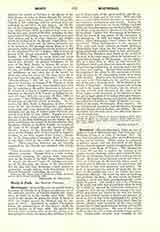

Montmirail (MONTE-MIRABILI), JOHN DE, son of Andrew, Lord of Montmirail and Ferte-Gaucher, and Hildiarde d’Oisy, b. in 1165; d. September 29, 1217. He was trained in piety by his mother, and well instructed in the secular sciences. Whilst young he embraced a military career, and was presented at the Royal Court, where he formed a lasting friendship with Philip Augustus; later King of France. The dissipations of court life led him to neglect the training of his youth; even his marriage with a most estimable lady, Helvide de Dampierre, failed to effect a change for the better. However, in his thirtieth year he met Jobert, Prior of St-Etienne de Montmirail, whose words of counsel proved sufficient to cause his conversion; and he turned to God with generosity and fidelity. He built an hospital for the sick of all kinds, but the objects of his predilection were the lepers, and those hopelessly afflicted. He loved the poor as brothers, and provided for them. He was severe on himself, wearing a coarse hair-shirt, passing frequently entire nights in prayer. Not satisfied with a life of holiness in the world, nor with that of a recluse, which he tried for a while, he entered the Cistercian monastery of Longpont, after having distributed amongst the poor all his possessions not needed by his wife and family; and he gave himself wholly to prayer and penance, so much so that he had to be reprimanded for going to excess. He had to bear every kind of insult from his former friends; even members of his own family abused him for having abandoned honor and wealth for poverty and subjection. But none of these things could weaken the fervor with which he sought perfection. Innumerable miracles were wrought at his tomb, and attract pilgrims even to the present day. Leo XIII granted a special office in his honor for the Diocese of Soissons.
EDMOND M. OBRECHT

